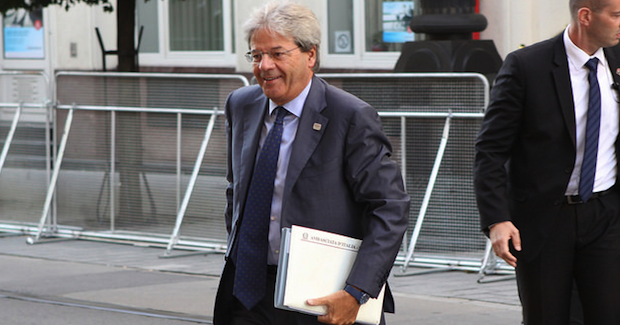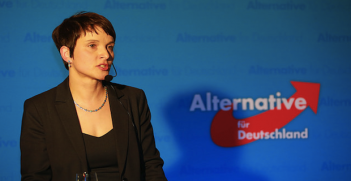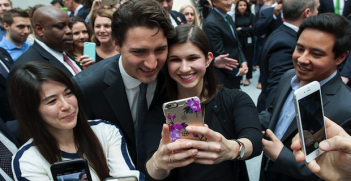Is Italy's New PM a Seat Warmer?

Following the resounding defeat of Italy’s constitutional referendum on 4 December, Matteo Renzi resigned as prime minister. Will his replacement Paolo Gentiloni, the former minister for foreign affairs, be a man for all seasons or just a useful idiot?
On Monday 12 December, Paolo Gentiloni Silveri became the 28th prime minister of the Italian Republic. He was born into an aristocratic family, one well connected to the Vatican diplomacy, in 1954. He is an experienced politician who has astutely navigated post-Cold War politics in Italy. In fact, Gentiloni’s political career is reflective of the Italian flag—he has identified with the radical left (red), the environmental movement (green), and the centrist-catholics (white).
When Renzi eventually worked his way up from party secretary to PM in 2014, Gentiloni was called to head the Ministry of Foreign Affairs after Federica Mogherini became the EU high representative for foreign affairs and security policy. Gentiloni was not Renzi’s first choice because of his dull media appeal and lacklustre ministerial performance. This is without mentioning his lack of technical expertise in foreign affairs. Nevertheless, Gentiloni was deemed a reliable and unthreatening supporter of Renzi, especially since 2013 when he sacrificed his political capital to run for Renzi’s camp in the Democratic Party primaries as mayor of Rome in the face of certain defeat. More importantly, it was the former President of the Republic, Giorgio Napolitano, the mastermind behind Berlusconi’s defenestration by Mario Monti in 2011 and Renzi’s power grab in the 2013 hung parliament, who pushed Gentiloni into Renzi’s cabinet.
As a foreign affairs minister, Gentiloni stayed true to his personal brand as an uncontroversial, dull and cautious administrator. As a torchbearer of centrist politics, Gentiloni proved a loyal supporter of US policies, particularly in the Middle East, where he duly supported Israeli opposition to the recognition of Palestine at the UN. Gentiloni’s negotiating skills were also tested in delicate situations and serious diplomatic incidents with India and Egypt, as well as post-Gaddafi Libya. As usual, Gentiloni kept his cool and used his wits to tread water without achieving anything substantial, yet keeping all sides at bay.
Gentiloni’s successor as foreign affairs minister, Angelino Alfano, will likely mirror Gentiloni’s approach and policies. Alfano is another dull yet safe mediator with no expertise in foreign affairs, and also a centrist catholic—albeit one from the conservative side. Alfano initially served under Berlusconi, and at 37 he was the youngest ever minister of justice. He broke away from the right-wing coalition after the last general elections in 2013 delivered a hung parliament. Afterwards, Alfano brokered a number of conservatives to support a grand-coalition government, and was rewarded with a position on the frontbench as interior minister and deputy prime minister under Renzi’s predecessor, Enrico Letta. Alfano then stayed on as the minister of the interior with Renzi, this time as the leader of the Nuovo Centro Destra (New Centre-Right), a small party formed by the leftover conservatives who chose not to follow Berlusconi’s decision to split from the grand coalition government.
Gentiloni’s cabinet is virtually identical to Renzi’s. In fact, of the major portfolios, only the ministry of education and research goes to a new entry, Valeria Fedeli, a former left-wing unionist and vice-president of the Senate. She is now in charge of mending problematic industrial relations in the public schools sector.
Gentiloni, or rather his centrist-catholic kingmakers in the Democratic Party, chiefly the Minister of Culture Dario Franceschini and President of the Republic Sergio Mattarella, is also keeping the few ministerial reshuffles within the ranks of the existing Renzi cabinet. In particular, the treasurer, Pier Carlo Padoan, a former chief economist of the OECD, remains in place to oversee the delicate bailout of the oldest bank in the world, Monte dei Paschi di Siena.
Accordingly, it is safe to assume that the internecine fights over control of the Democratic Party will ultimately dictate the direction of Gentiloni’s government. The centrist-catholic leadership of the Democratic Party (Renzi for the moment stays in charge as secretary) chose Gentiloni as little more than an unassuming caretaker before the next general elections due by early 2018. Gentiloni became PM because he is an unlikely contender in the next elections. Therefore, the real contestants, namely Renzi, Franceschini and someone from Bersani’s left faction, are using Gentiloni as a buffer to buy time for their showdown in the next congress of the Democratic Party, due before the next general elections.
Besides that, the main tasks ahead for Gentiloni’s tenure will be hosting the next G7 meeting in Sicily, scheduled for May 2017, managing the difficult budget situation with the EU, and especially the redesign of the electoral laws, which were declared unconstitutional by the High Court in 2014. The constitutional referendum kept the electoral law changes in limbo for over two years, but now the constitutional judges are able to definitively settle the legal challenge, which is likely to happen by the end of January 2017. After then, surely the political camps will fire up, ready for the final, harshest fight of the legislature.
Paolo Gentiloni at first sight appears to be the sensible choice to negotiate deliberative policies from behind the scenes of the Italian institutional and financial impasse. This is particularly important at a time of turbulent politics in Europe and the US. Given these circumstances, at the end of his accidental tenure, Gentiloni might end up being saluted as a politician of conscience who adapts to all circumstances and times despite external pressure—a man of all seasons to use Robert Bolt’s memorable depiction of Thomas More.
On the other hand, there is also a significant risk that Gentiloni’s style and action will not rise to the task. In fact, treading water may simply prove inadequate to meet the dire demands of long overdue political and socioeconomic reform in Italy. In this case, Gentiloni will likely be remembered as a useful idiot, an unconscionable prime minister who let his party leaders cynically use him.
Dr Giovanni Di Lieto lectures international trade law at Monash University. He was previously a legal practitioner in Italy.
This article is published under a Creative Commons Licence and may be republished with attribution.





